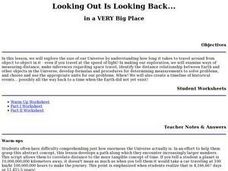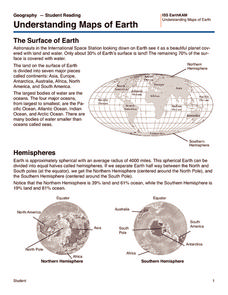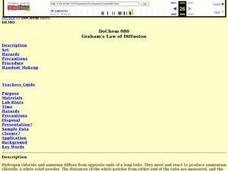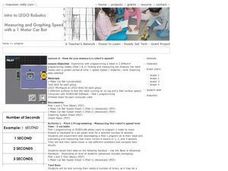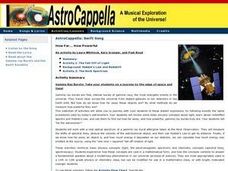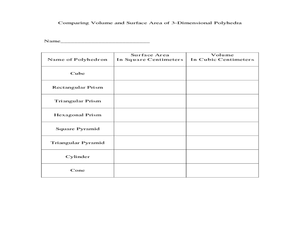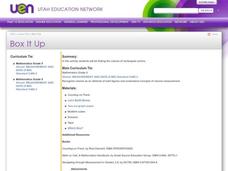Curated OER
Looking Out Is Looking Back...
Students explore the size of our Universe by understanding how long it takes to travel around from object to object in it - even if you travel at the speed of light! In making our exploration, we will examine ways of measuring distance,...
Curated OER
Magnify It!
Students view objects of various sizes from several viewing distances to discover that their visual field is limited. They record what they see and compare their observations with classmates. They conduct more structured experiments.
Curated OER
Inventions- The Impact
Students discuss the impact of certain inventions. In this technology lesson, students research Thomas Edison and the light bulb on the Internet and discuss how the invention impacted society. Students create their own simple inventions.
Curated OER
Is There Liquid Water on Mars?
Learners assess whether there is liquid water on Mars by analyzing images and data. In this planetary lesson students analyze temperature and pressure graphs and hypothesize about how water could have flowed on Mars.
Curated OER
Show Me the Way To Go Home
Students place a pencil perpendicular to the ground and trace its shadow between 11:30 AM and 12:30 PM. They measure the length of the shadow, periodically over several hours, in either English or Metric units. Using the data, they find...
Institute for Geophysics
Understanding Maps of Earth
Here is your go-to student resource on primary geography concepts, including facts about the surface of the earth and its hemispheres, latitude and longitude, globes, types of maps, and identifying continents and oceans.
Curated OER
Earth's Heavenly Treasures: Hummingbirds
Young ornithologists watch an informative video and use the Internet to gather data about the life, size, habitat, and migration of hummingbirds. The interdisciplinary lesson includes activities that target art, science, math, and...
Discovery Education
Sonar & Echolocation
A well-designed, comprehensive, and attractive slide show supports direct instruction on how sonar and echolocation work. Contained within the slides are links to interactive websites and instructions for using apps on a mobile device to...
Curated OER
A DISAPPEARING ACT Astronomy: Do Stars Always Shine?
Learners observe why stars are not visible during the day with a classroom demonstration using an index card punched with holes.
Curated OER
How Far Away
Learners investigate how a historic map drawn in the early days of interstate automobile travel represented distances. They measure distance within their personal space.
Curated OER
MAPPING THE TOPOGRAPHY OF UNKNOWN SURFACES
Students describe in words and graphic displays the elevation or depression profile of sections of Mars' Olympus Mons and/or Valles Marineris. They explain how orbiting spacecraft build up global maps one data slice at a time.
Curated OER
Draw A Face
Young scholars discover how to sketch a face. In this sketching instructional activity, students explore the steps to construct a facial drawing. Spacing and symmetry of facial features are explored.
Curated OER
Domino Dash
In this speed worksheet, students use dominoes to measure the average speed of rows falling over. Students make a line graph to show the relationship between the length of the domino row and the time. Students answer 8 questions about...
Curated OER
Graham's Law Of Diffusion
Students demonstrate Graham's Law by observing a gaseous diffusion. After a lecture/demo, students perform an experiment then complete a write up activity which is imbedded in this plan to reinforce what they have observed during the...
Curated OER
Introduction to Lego Robotics
Students utilize computer programs to operate a simple robot. In this technology lesson, students create robots using Lego pieces and simple motors to move them. Students measure the speed of the robots by running Robolab...
Curated OER
Automobile-Accident Reconstruction
Students investigate an accident and relate it to math. In this trigonometry lesson, students measure the accident scene, the friction produced, and the speed from the skid marks. They create a poster of their findings.
Curated OER
Close Enough?
Students examine how navigation is based on mathematics and how making a mistake in measuring an angle could have an impact on a target. They observe a teacher-led lecture, use a calculator to complete two worksheets, and participate in...
Curated OER
Proportionality, Ratios and Constant Variation
Young scholars use Scion Image to estimate the proportion of space images. In this proportion lesson, students investigate the online site of Image of the Orbitor and relate the dimensions and sizes to known sizes.
Curated OER
Navigating by the Numbers
Students observe how math is important in navigation and engineering. They study how surveyors use math and science to calcute, count, measure, label, and indicate distances on a map. They estimate specific distances.
Curated OER
How Far... How Powerfu
Young scholars work with a real optical spectrum of a gamma ray burst afterglow taken at the Keck Observatory. They measure the shifts of spectral lines, deduce the velocity of the astronomical object, and then use Hubble's Law to get...
Curated OER
GPS Sports Field Activity
Learners practice using GPS receivers and explore how knowing the coordinates of two locations allows them to determine the distance between those two points. They use the theory that they already had knowledge of and apply it to a...
Curated OER
The Value of Volume
Students measure the perimeter and area of their polygons. In this geometry lesson plan, students calculate the volume and area using the correct tools. They calculate the time and temperature and the perimeter and side lengths of...
Curated OER
Meet the Neighbors: Planets Around Nearby Stars
Students explain why a transiting planet causes a periodic dimming in the light from its parent star. They determine the radius of a planet, and its orbital distance, by analyzing data and manipulating equations. Students compare the...
Curated OER
Box It Up
Fifth graders make boxes. In this prisms lesson, 5th graders read the book Counting on Frank and discuss the different things that the boy measures. Students make boxes of various sizes using graph paper and find their volume.
